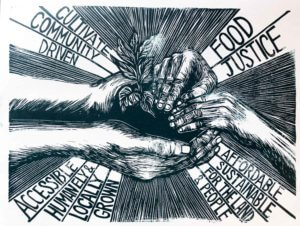Why We Can’t Separate Justice and Sustainability in the Food System
By Lauren Phillips-Jackson | July 28th, 2019

It often seems that among groups of thoughtful, conscientious, people, opinions are divided about the most pressing issues of our time: should we focus our efforts environmental degradation and climate change, or should we focus them on the human rights abuses and injustices around the globe? What we often don’t realize is that these issues, as disparate as they may seem, are inextricably linked.
In a powerful article Rafter Ferguson, a political agroecologist, lays out why without social justice there can be no sustainable food system, and why without a sustainable food system we will never achieve justice for all people. He explains the history of food systems in America, connecting the dots between slavery, the theft of land from Native Americans, the consolidation of farming, and the loss of traditional methods of growing and cooking food with the environmentally taxing, industrial agricultural system we have today. He explains how the,
“systematic segregation of poor communities and communities of color from affluent and white communities creates the conditions for a literal food apartheid: fresh and minimally processed foods are sold at high prices for select markets that are geographically and economically inaccessible for the marginalized communities, who in turn provide a captive market for the highly processed and refined products of industrial agriculture. These apartheid conditions, the attendant loss of culinary and nutritional knowledge, and the staggering rise of diet-related health problems, are all symptoms of a food system designed for profit rather than care.
Here at the Common Share Food Co-op, the intersections of environmental and social justice lie at the very core of our mission. We envision and actively work towards a world where all people have access to healthy, fresh foods and are able to exercise autonomy over their lives and choices. We strive to engage those most affected by this food apartheid and assist them in envisioning and working towards a community that meets their needs. This commitment is summed up in our mission statement that: “owned by workers and consumers, the Co-op is a grocery store that draws together the diverse communities of the Amherst area in an inclusive space supporting food justice and local resilience.”
As Ferguson poignantly puts it:
“as the problems are related, so are the solutions—and our strategies must reflect that. First and foremost, let’s do away with the idea that anyone could build a sustainable food system without centering social justice in the process. Only a broad and deeply inclusive coalition will bring enough of us together to marshal the kind of political power needed to change the status quo. Only a movement that acknowledges these legacies and prioritizes the voices of those who’ve been marginalized in the current food system will be able to assemble such a coalition. Furthermore, only such broad and deep coalition will give us the insight and depth of perspective we need to create truly workable solutions. When people are left out of shaping the solutions to the problems they face, the solutions fail. To make a new food system we need everyone at the table.”
With your help, we will continue to work towards this dream of environmental and food justice for all.
